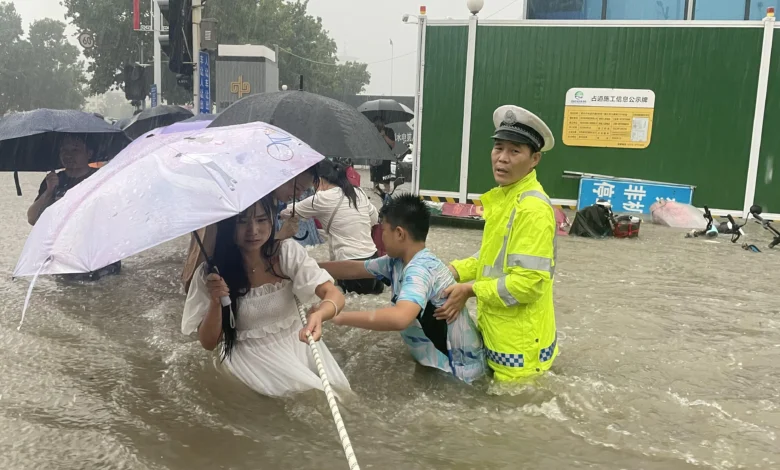China’s climate emergency: The need for global Action
The summer in China this year has been marked by a dramatic contrast of extreme heat and devastating floods, an unprecedented phenomenon.

Staying informed about global happenings is integral in our interconnected world. This summer, a devastating climate crisis unfolded in China. As a concerned global citizen, you may be wondering, “What exactly happened? How severe was it? And what implications does it have for our collective future?” This article is here to answer all your questions. Let’s look into understanding China’s summer of climate destruction.
What Happened?
While we were grappling with our own monsoon mayhem back home in India, our neighbor to the East experienced an unparalleled environmental catastrophe. Torrential rains, floods, typhoons, and landslides ravaged various parts of China, leading to loss of life, property, and massive disruptions.
China’s climate destruction in the summer of 2021 was a wake-up call to the world about the catastrophic impact of climate change.
The Impact in China
Zhang Junhua, a 38-year-old local, stands beside his rice field, now rendered completely futile due to the flood. “In my entire life, I’ve never witnessed a flood here,” he confesses, adding, “We simply didn’t anticipate this.”
Fortunately, with sufficient early warnings, Zhang’s family and friends managed to reach safer grounds. Nevertheless, the village is bracing itself for the challenging months ahead.
Moreover, the calamity in Heilongjiang Province, located in north-east China, has significantly disrupted the nation’s food supply chain.
This past month, the region’s renowned Wuchang rice crop was devastated, with 40% of it washed away by the flood’s force. The landscapes, which would typically be verdant, are now lifeless and brown.
Zhao Lijuan, another farmer, reflects on the irreversible losses, “Our crop fields were all submerged. We can’t plant again this year,” she says, attempting to maintain a philosophical outlook amid the crisis.
Zhao further adds, “The losses are incalculable. We have tens of thousands of acres of rice fields here. When I saw the water engulfing the fields, I couldn’t help but break down. The flood destroyed everything, and I fear the typhoons might return.”
The recent floods have claimed at least 81 lives, including some who were attempting to save others.
Furthermore, the economic repercussions are far-reaching in a country already grappling with the aftermath of strict COVID-19 control measures imposed over the past three years.
If the government seeks to assess the immediate cost of failing to tackle climate change urgently, their own records could provide a stark reality check.
In just over a decade, the number of recorded floods in the country has skyrocketed tenfold.
To put things into perspective, the summer of 2011 saw between six to eight monthly floods in China. In stark contrast, last year witnessed more than 130 floods in July and 82 in August alone.
Warnings from Greenpeace and Rising Concerns
Dr Zhao Li, a representative from Greenpeace East Asia, has brought to light the fact that the increase in reported flood numbers from China could be attributed to enhanced systems for monitoring and recording flood data. Yet, she asserts that the overarching culprit remains global warming.
She elucidates, “With warmer temperatures, evaporation rates are enhanced, leading to an increase in atmospheric moisture. This surge in moisture content can intensify rainfall and propagate more frequent and severe storms, including hurricanes and cyclones.”
A study by Greenpeace conducted two years prior, using UN climate panel mapping, predicted that heatwaves and extreme rainfall could effectively extend the summer season by one month during this century in provinces surrounding Beijing and Shanghai. For the Pearl River delta, the extension could exceed 40 days.
Officials from China’s own Meteorological Administration have confirmed an increase in extreme high temperatures and extreme precipitation since the mid-1990s.
However, Dr Zhao warns us that we, as a global community, are ill-prepared for the impending extreme weather events. “Our recent experiences with the floods underscore this reality,” she states.
She continues, “Upgrading all our infrastructure to withstand floods of a severity experienced only once in centuries is an immense and perhaps unrealistic task. But climate change is bringing those once-a-century events into a recurring rotation, indicating we will soon have to manage yet another disaster.”
Using Dams to Control Floods: Making Tough Decisions
In an attempt to mitigate the impact of recent floods, Chinese officials have employed a system of dams to alter the direction of waterways. However, this strategy presents a problem – the redirected water must go somewhere, and in this case, it was Zhuozhou in Hebei Province that bore the brunt of it.
These are challenging decisions that ultimately come down to a government’s judgement of who must endure the hardship for the greater good. For many in Zhuozhou, a brighter future seems to be a distant dream.
Further Losses
Mr Zhang, a small business owner in Zhuozhou, laments, “It’ll take me eight to 10 years to recover from these losses. The government has not mentioned anything about compensation. I run two shops – what can I do now?”
A few weeks ago, cars were slowly navigating through the lingering floodwaters and sludge on the main street. On either side of the road, mud-caked vehicles with shattered windscreens stood as stark reminders of the powerful surge of water.

Mrs Han, a warehouse operator, describes the devastation, “We suffered significant losses: trucks, other vehicles, our goods, furniture – everything we owned was wrecked.” She points out how even goods stored on high racks, well above three metres, were ruined.
Upon opening the door to their nearby home, a thick layer of mud is revealed, covering everything. “Every day we try to clear out more mud,” she says. “I can’t describe how I felt when I saw this. It’s as if our life’s work is over.”
Climate Scientists’ Caution and Global Responses
Climate scientists are quick to caution against viewing any single extreme weather event in isolation. In June, northern China experienced scorching temperatures over 40C (104F) for weeks, followed by a month’s worth of rain in just 24 hours.
Prof. Cascade Tuholske comments, “These weather events do occur independent of climate change. The mechanisms driving individual or compound events, like the heatwaves and floods impacting China this summer, are complex. However, climate change is making these extreme events more frequent and severe.”
The professor, a geographer at Montana State University, adds that “climate change-driven weather extremes pose a serious threat to China due to its dense population and its role as a major global economy.”
He also highlights that “for every tonne of CO2 left in the ground, fewer people in China will suffer in the future.”
Why should it matter to us in India?
You might wonder, “Why should we, sitting here in India, be concerned about these climate events in China?” Here’s why:
- Shared Vulnerability: Both China and India are part of the same Asian continent, sharing similar geographical and environmental conditions. This means that the extreme weather events affecting China could very well hit us too. In fact, we’ve already begun to witness such extremes in our own country.
- Interconnected Climate: Remember, the Earth’s climate system is interconnected. Changes and disturbances in one part can have ripple effects across the globe, impacting weather patterns elsewhere. Therefore, the climate events in China could potentially influence our monsoon patterns, temperature extremes, and more.
- Lesson in Preparedness: The disasters in China serve as a stark reminder and lesson in disaster preparedness and management. As we face our own climate challenges, it’s crucial that we learn from these incidents and fortify our systems and infrastructure accordingly.
In conclusion, China’s summer of climate destruction is a wake-up call not just for them, but for us in India and the entire world. We’re all in this together, and it’s time we paid attention and took decisive action to mitigate such climate catastrophes.
Please, also have a look into : China’s sudden lifting of COVID curbs led to 2 million more deaths: US study



